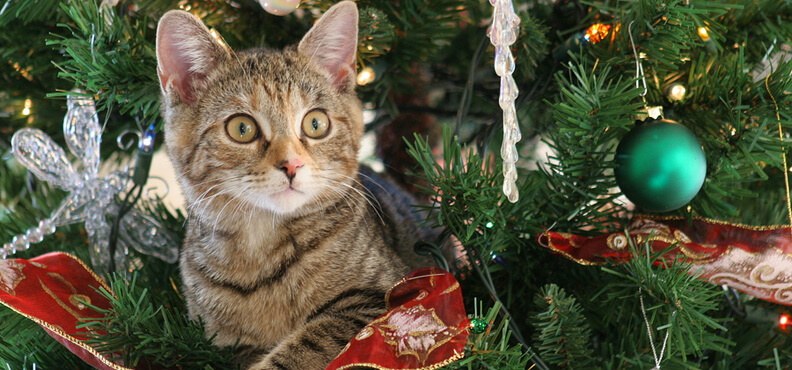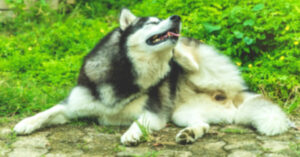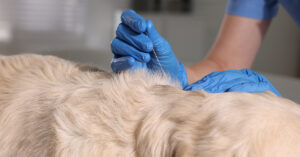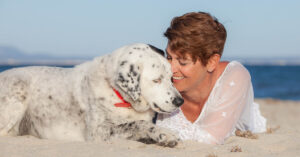Holiday safety for pets begins before the holidays even begins! As we enter into another holiday season, there are many things we need to be aware of to keep our pets safe. The holidays create lots of changes in a pet’s environment that could lead to potential dangers. We need to take special care during the holidays to keep our pets safe and our holidays happy!
Today, I’ll focus on a few of the most common holiday dangers we see causing cases to come into our office.
Holiday Safety for Pets – Chocolate
Chocolate is probably the most well known toxin to dogs. Most people know not to give their dog chocolate intentionally but most ingestion occurs when the owners aren’t watching! I’ve seen cases where the client left their dog in the car for just a minute while they ran into a store only to find the pound of fudge for that night’s holiday party was missing upon their return. It seems festive to leave brightly wrapped chocolates out on a coffee table but you shouldn’t be surprised to come home and find the bowl empty. Please be aware that the baker’s chocolate – especially common around the holidays – is the most toxic to your dogs. Baker’s chocolate contains the highest level of theobromine, the toxic agent within all chocolates.
Holiday Safety for Pets – Yeast in Dough
Recent research has found that an equally common but much less conspicuous danger lurks in your kitchen. It’s been discovered recently that bread dough is a potential toxin to our pets. We haven’t seen too many cases but you don’t want to be one of the first! The toxicity of bread dough is dose-dependent on the amount of dough ingested, but I would never risk it and offer my dogs bread dough. The yeast used in dough can form high levels of ethanol inside dogs which can be potentially fatal if enough is consumed.
Holiday Safety for Pets – Plants
Holiday plants such as poinsettia, mistletoe, and holly all have varying levels of toxicity for both cats and dogs. These plants can cause everything from vomiting and diarrhea to seizures and even death based on the amount of plant material ingested or chewed on by your pets. Play it safe and try and keep these plants out of reach from curious pets.
Holiday Safety for Pets – Christmas Trees
The sparkling lights and smells of Christmas trees are particularly fascinating to pets. All of the new colors and smells are sometimes too much to resist. The water for the tree can be potentially toxic even though the additives made for the water are usually pet safe. Fertilizers, bacteria and even the resin from the tree may make your pet sick. Always cover the water for the tree with a sturdy tree skirt. Ornaments can be dangerous with the metal hooks and many are made of glass. Tinsel can cause intestinal obstruction and there is a risk of electrical shock from the lights.
We’ve had several trees knocked or pulled over by curious pets, so consider wiring your tree to the wall to prevent your pet from tugging on the tree and pulling it over on themselves. Remember too, your pets’ toys can be dangerous if they’re able to chew them into pieces that might be swallowed and cause intestinal obstruction.
Holiday Safety for Pets – Fatty Foods From the Family Feast
Finally, resist the urge to allow your pets to indulge in the family’s holiday feast. Do not give your pets food from the family table. We commonly see cases of vomiting or diarrhea after a holiday. Sometimes it is “just” gastroenteritis with inflammation of the stomach and intestines, but sometimes it may lead to pancreatitis. Pancreatitis is a potentially life threatening inflammation of the pancreas usually induced by a high fat meal (ie stuffing!). Treatment requires hospitalization with intensive fluid and antibiotic treatment. Most cases will have to stay at least 3-5 days in the hospital.
Having pancreatitis once sensitizes your pet to recurrence anytime they have a high fat intake. However there’s an even larger risk lurking from ingesting fatty food as some pets will develop diabetes after pancreatitis if the areas of the pancreas that produce insulin are damaged. Clearly there is just way too much at risk for that momentary pleasure of slipping our pets some goodies under the table.
The holidays are a special time for us and our pets. They are such a big part of our lives and our memories. If you have any questions about how to ensure your holidays are safe and happy for you and your pets feel free to talk to any of the staff here at Laguna Beach Veterinary Medical Center at (949) 464-1000. It only takes a little time and effort to ensure that our pets are safe and the holidays are healthy and happy times.
Happy Holidays from all of us at Laguna Beach Veterinary!



